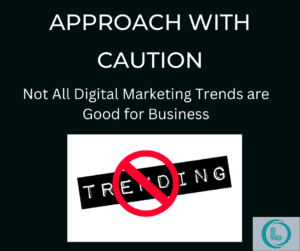
Digital Marketing Trends: New isn't always good.
In today’s rapidly evolving digital landscape, there is always a new trend or tactic in digital marketing that promises to be the next big thing. However, it’s important to remember that not all new trends are necessarily the best for every business. In fact, some new trends can actually be detrimental to a business’s digital marketing efforts. In this blog post, we’ll explore why new trends in digital marketing aren’t always the best and highlight some types of new trends that businesses should approach with caution.
Why New Trends Aren’t Always the Best
There are a variety of reasons why new trends in digital marketing aren’t always the best for every business. The following are some factors to consider:- Not All Trends Are Relevant: Just because a trend is popular or gaining traction doesn’t mean that it’s relevant to every business. Trends that work well for one industry or audience may not work well for another. It’s important to carefully evaluate trends and determine if they’re relevant to your business and audience.
- Limited Data: New trends often lack the data and proven results that more established tactics have. This means that businesses may be taking a risk by investing in a new trend that hasn’t been thoroughly tested or validated.
- Short-Term Focus: Many new trends are focused on short-term gains rather than long-term success. While it’s important to see results quickly, it’s equally important to focus on sustainable growth and long-term success.
Types of New Trends to Approach with Caution
While it’s important to stay up-to-date with the latest trends in digital marketing, businesses should approach new trends with caution. The following are some types of new trends that businesses should evaluate carefully:- Social Media Platforms: New social media platforms are constantly emerging, promising to be the next big thing in social media marketing. While it’s important to be present on the platforms where your target audience is spending time, it’s also important to evaluate new platforms carefully. Many new platforms fail to gain traction or don’t attract the right audience, which can be a waste of time and resources for businesses.
- Influencer Marketing: Influencer marketing has become a popular trend in recent years, with businesses partnering with social media influencers to promote their products or services. However, it’s important to carefully evaluate the effectiveness of influencer marketing and ensure that influencers align with your brand values and target audience. In some cases, influencer marketing can be costly and yield limited results.
- AI and Machine Learning: Artificial intelligence (AI) and machine learning have become buzzwords in digital marketing, promising to revolutionize the way businesses approach marketing. However, AI and machine learning can be complex and require significant investment in technology and expertise. Businesses should carefully evaluate the benefits of AI and machine learning and determine if they align with their marketing goals and budget.
- Chatbots: Chatbots have become increasingly popular in recent years, offering businesses a way to automate customer service and engage with customers in real-time. However, chatbots can also be impersonal and frustrating for customers who prefer human interaction. It’s important to carefully evaluate the effectiveness of chatbots and determine if they align with your brand values and customer experience goals.
